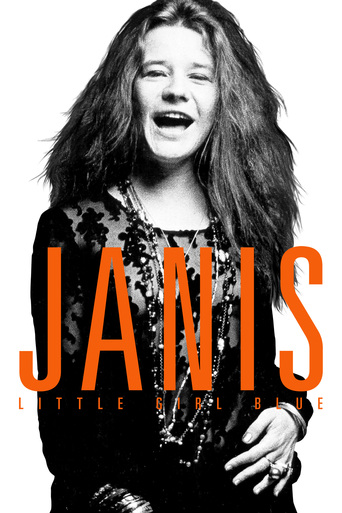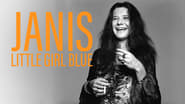TxMike
I found this documentary on Netflix streaming. Janis Joplin and I are contemporaries, she grew up in a conservative home in Port Arthur, Texas. At that same time I often visited my aunt in Port Arthur. Janis and I could have run into each other as kids, but we probably didn't.When you see some of the interviews with Janis you can only conclude that she was very smart and had a gift for analyzing things and presenting her ideas. Most very gifted artists, musicians, singers are very intelligent, it is part of the package. But Janis was a mediocre student in high school and was a misfit of sorts, a kind soul who couldn't or didn't want to conform. But all she ever wanted was to be accepted and loved.Perhaps her lowest point was when she went to U of Texas and she was not only nominated for the prank contest "Ugliest Man on Campus" she was voted the winner. Shortly after she left Texas and ended up in San Francisco where she found people like her. She really had no idea at first that her singing was very special but she soon became famous and things were written like "The most important new voice since Aretha Franklin." In truth I never cared for Janis Joplin's singing, too raspy and too much shouting. But there is no doubt she moved audiences and when she was in the mood had a very lovely and soft lyrical style. Her demise was a result of having absolutely no clue what to do with herself when not recording or performing. It was her life and it was just one more heroin fix in her room after a performance that cut her short in 1970 at the young age of 27.This is a superb documentary, one of the very best I have ever watched. There is much footage of Janis herself, and close-ups during performances almost bring you into her intimate world. It also has input from her brother and sister, some old friends, and some old band mates.The film is narrated by actress Cat Power who often reads from letters Janis ad written to others and it is almost like hearing Janis herself.
Dr Jacques COULARDEAU
Nostalgia has no limit, no limits, absolutely none. It is in fact the frontier to dreams and the future, no matter how you look at it. With no nostalgia there is no imagination – nothing new under the sun except new assembly of old, eternal, ever present emotions.And emotional you have to be and get with this invocation of Janis Joplin.It was the dense and tumultuous time of "Fritz the Cat" (1972) and "Zabriskie Point" (1970). Three great artists and performers among the most innovative minds of their time, Jimi Hendrix (1942-1970), Janis Joplin (1943-1970) and Otis Redding (1941-1967) died, two of an overdose and one in a plane crash. What a loss.The only woman in that triad, who was not the first woman in rock-and- roll in spite of what is said in the film, was the direct white heiress of blues, jazz and black music, all represented by Aretha Franklin (1942-and still living and kicking, and even making Obama wax sentimental in public) who was a black woman in this field before Janis Joplin. The film does mention her and the fact she was the model, the inspirational muse of Janis Joplin, which made Janis Joplin second in this music, even if she was the first white woman.What did Janis Joplin contribute to the world of modern amplified polyrhythmic music? A lot, indeed a lot, even more than just a plain lot.She had very hard, realistic and powerful lyrics that exposed society the way it was felt and suffered by young people in the 1960s and early 1970s. She had a singing style and voice that were unique at the time among women and first of all white women singers. She was possessed in her music by hope for sure, but with the conscious certainty that this hope would be betrayed, and it was of course, naturally and without any failure. We can always count on one thing from this rotten world we live in: it will betray our hope, our hopes and even our plain submissive obedient and subservient wishes. And betrayal is the major master word of this hell of a life we have to live through. In spite of the flashes of bliss from time to time when an emotion is responded to emotionally, when our love is received and shared with pure love and not short term greed or lust.It was betrayed by the use of drugs that made the hopeful forget the world cannot change in the proper direction, in the direction of human freedom, if you exit it by artificial means into virtual dreams of psychedelic freedom that turned into nightmares, like in the film "More" (1969) or those I have already quoted. That means the world can only change in the proper direction if you remain conscious and united towards that objective that you in no way control but onto the outcome of which you can weigh and even be of some influence by making your collective parameter heavier in front of the millions of other parameters that dictate history. Janis Joplin could be one of those who mobilized millions of individuals into pushing history in the right direction, which did not mean left or right, but right and not wrong. In the countries where they twinned up right with left and not wrong, they were made the slaves of decisions taken by others and of cosmic phenomena beyond any human control.Betrayed it was by the use of violence and here the film is silent about the Black Panthers and their being systematically killed by the dozens in Chicago or other places. And that's what one should only care about in that period: the systematic repression of any protest around and after 1968. No allusion to the assassination of Martin Luther King and Senator Robert Kennedy. No mention of the Vietnam War and the millions of people killed or maimed over there in the name of democracy and freedom for – and only for – the Americans and maybe here and there the West reduced to its anticommunism of Mathuselah's ancient times. And that was then "Good Morning Vietnam" (1987) that will take twenty years or so to come out of its Pandora's box of napalm and other green berets' adventures, capers, brutality and barbarity.Betrayed by all sorts of crooked, more or less crooked, rather more than less crooked, politicians from A.B. Johnson to Richard Nixon, via Spiro Agnew; and Ronald Reagan was just in the near future. There the worst part is that this systematically warped democracy enables the majority of those who want tranquility and no disruption in their everyday life and comfort, be they favorable to change or not, to always have the last word. The last reform of importance was the 26th amendment lowering voting age from 21 to 18, ratified in 1971, though not the lowering of drinking age and a few other age limits of that type, like being able to enter the music "saloons" or music bars on Bourbon Street in New Orleans and many other places where the best music was performed. It did not change anything in the logic of the political system, hence the social dependence we all cling to. And Nixon was reelected in 1972 by all these young 18, 19 and 20 year old voters. The debate was raging about this lowering of voting age from what I remember when Janis Joplin was at the highest point of her stardom just when she "decided" to OD in a motel room, alone.You can make a star out of a person but that person's solitude is even greater than before because stars are NOT dancing together. And what's more these stars are black stars and we all know what happens to black stars that could be starry star-like black holes.Dr Jacques COULARDEAU
Que no me toque un alto delante
An experienced documentarist who poses her eye on one of the greatest in the history of music. Very remarkable the amount of footage of Janis in her glory days. Presetns a lot of testimonials from people very close to her(both professionally, and personally), which allows us to feel a little more closely, both the achievements and thesuccesses, as well as the sorrows and sufferings of the genius of Janis. Another positive aspect is the letters or written records of Janis. IT also lets us enjoy many moments of live music, which is always good in a music documentary. Very exciting and entertaining.
Alex Deleon
Viewed at 2015 Venice Film Festival., "Janis, Little Girl Blue" by Amy Berg, With Alex Gibney, himself an outstanding documentarian acting as producer, is a Great Doc about a great American singer, Janis Joplin, who died too young on the verge of salvation. Interviews with parents, sister, brother, surviving members of The Grateful Dead, Kris Kristofferson, and most surprising, Dick Cavett (1970). In a year of many good documentaries, this was the best of all -- a marvelous reconstruction of a tragic young life. Janis sang the blues with such conviction and such black feeling that even afro-Americans though she was black -- She died on October 4, 1970 in a Hollywood motel of an accidental heroin overdose at age 27 -- only two weeks after another rock legend, Jimi Hendrix, also at age 27. The film traces her life from humble origins in the nondescript north Texas town of Port Arthur, constant humiliation by her schoolmates because of her extreme nonconformity and relatively plain looks, up through her rise to prominence as the lead singer of the acid/rock band Big Brother and the Holding Company --one of the leading San Francisco rock groups of the mid sixties -- reaching the pinnacle when recognized as the top white blues singer of the age, her difficulties dealing with fame, her loneliness in the midst of adoring crowds, her battle with drug addiction, and finally her tragic early death on the verge of even wider fame and general acceptance by the serious music world. Needless to say, the film is liberally spiced with clips from her amazing stage appearances, which is an added enrichment, but this is far from a mere excuse to present her songs -- far more a penetrating probe into the life of an extremely complex personality ---a true artist who became the victim of her own profound talent. Myself more or less a product of the psychedelic sixties, I left the vast Venice theater thoroughly emotionally drained and realizing I had just witnessed a remarkable film about a most remarkable life. Alex, Budapest


